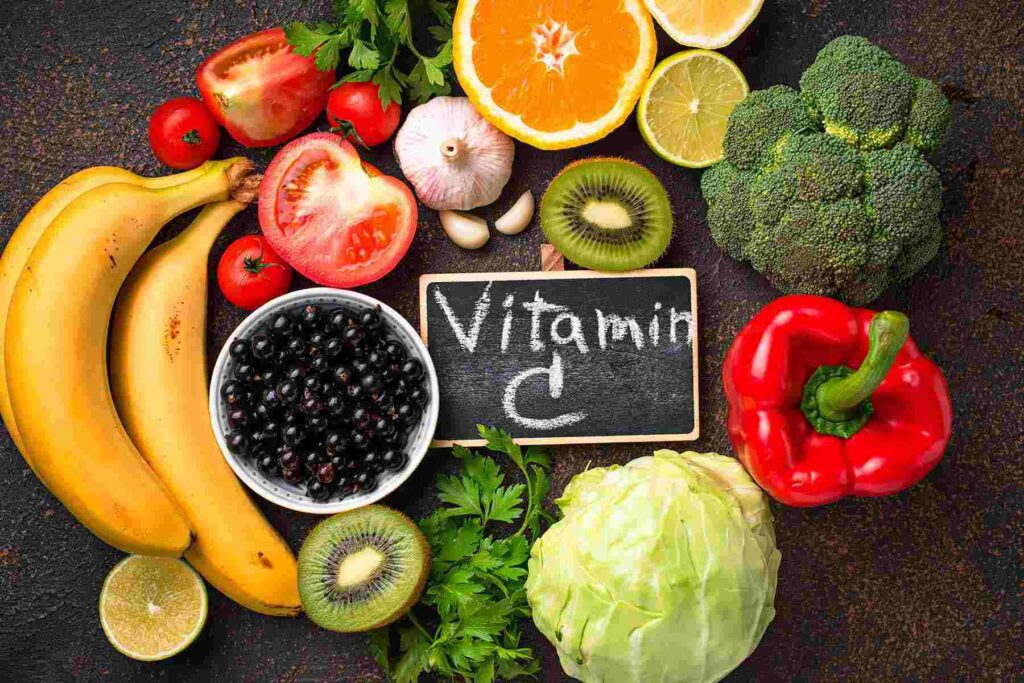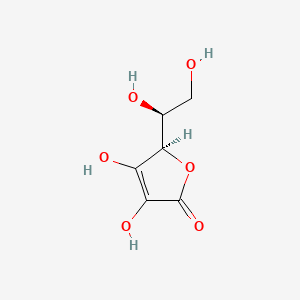Vitamin C, also known as ascorbic acid, is an essential nutrient that plays a crucial role in various physiological processes within the human body. It is a water-soluble vitamin that cannot be synthesized by humans, necessitating its intake from dietary sources. This comprehensive analysis will delve into the properties, biosynthesis, biological functions, and deficiency implications of Vitamin C (Ascorbic acid).

Table of Contents
Properties of Vitamin C(Ascorbic acid)

Ascorbic acid, the chemical name for vitaminC, is a white, crystalline compound with a slightly acidic taste. It is highly soluble in water and exhibits strong antioxidant properties due to its ability to donate electrons and neutralize free radicals. VitaminC is relatively stable in acidic environments but degrades quickly when exposed to heat, light, and oxygen.
Biosynthesis of Vitamin C(Ascorbic acid)
Unlike most animals, humans lack the enzyme L-gulonolactone oxidase, which is essential for the final step of vitaminC biosynthesis from glucose. Consequently, humans are dependent on dietary sources to obtain this crucial nutrient.
Biological Functions of Vitamin C(Ascorbic acid)
VitaminC is involved in numerous vital biological functions, impacting various systems throughout the body:
1. Antioxidant Defense
VitaminC acts as a potent antioxidant, protecting cells from damage caused by free radicals. It neutralizes reactive oxygen species (ROS), reducing oxidative stress and mitigating the risk of chronic diseases like cancer and heart disease.
2. Collagen Synthesis
VitaminC is a cofactor for enzymes involved in collagen synthesis, a protein that provides structural integrity to skin, bones, tendons, ligaments, and blood vessels. Deficiency can lead to collagen defects, resulting in symptoms like scurvy, characterized by fragile blood vessels, impaired wound healing, and weakened connective tissues.
3. Immune System Support
VitaminC plays a critical role in immune system function. It promotes the production of white blood cells, which are essential for fighting infections. It also supports the production of interferon, a protein that inhibits viral replication.
4. Iron Absorption
Vitamin C enhances the absorption of non-heme iron from plant-based foods by converting ferric iron (Fe3+) to ferrous iron (Fe2+), which is more readily absorbed by the body.
5. Wound Healing
VitaminC (Ascorbic acid) is essential for wound healing, as it aids in collagen production and promotes the formation of new blood vessels.
6. Neurotransmitter Synthesis
VitaminC is involved in the synthesis of neurotransmitters like dopamine and norepinephrine, which are crucial for mood regulation, attention, and memory.
7. Carnitine Synthesis
VitaminC is necessary for the synthesis of carnitine, a molecule that plays a role in fat metabolism and energy production.
Deficiency of Vitamin C: Scurvy
Scurvy is the clinical manifestation of vitamin C deficiency. It is characterized by a range of symptoms, including:
1. Fatigue and Weakness
Lack of vitaminC (Ascorbic acid) affects collagen production, weakening connective tissues and causing fatigue.
2. Bleeding Gums and Loose Teeth
Scurvy compromises gum tissue health, leading to bleeding gums, swollen gums, and tooth loosening.
3. Skin Changes
The deficiency affects collagen production, leading to skin fragility, bruising, and poor wound healing.
4. Joint Pain and Swelling

Scurvy weakens the connective tissues in joints, causing pain and swelling.
5. Anemia
Vitamin C deficiency can lead to iron deficiency anemia due to impaired iron absorption.
6. Impaired Immune Function
Scurvy weakens the immune system, increasing susceptibility to infections.
7. Psychological Changes
Severe scurvy can lead to psychological changes like irritability, anxiety, and depression.
Preventing Vitamin C (Ascorbic acid) Deficiency
A balanced diet rich in vitamin C-containing foods is essential to prevent scurvy. Some of the best sources of vitamin C include:
Fruits: Citrus fruits (orange, lemon, grapefruit), strawberries, kiwi, guava, papaya, mango
Vegetables: Broccoli, Brussels sprouts, cauliflower, peppers, kale, spinach, tomatoes
Other sources: Potatoes, sweet potatoes, green beans
Recommended Dietary Intake
The recommended daily intake of vitaminC varies based on age, sex, and physiological status. The National Academies of Sciences, Engineering, and Medicine recommends the following daily intakes:
Adults (19 years and older): 75-90 mg
Pregnant women: 85 mg
Breastfeeding women: 120 mg
Conclusion
VitaminC is an essential nutrient vital for maintaining overall health and well-being. Its role as an antioxidant, its contribution to collagen synthesis, and its support for immune function are just a few of its crucial roles in the body. By consuming a balanced diet rich in vitamin C-containing foods, individuals can ensure adequate intake and prevent the development of scurvy. However, it is important to note that high doses of vitaminC supplements may be detrimental and should be discussed with a healthcare professional.
Frequently Asked Questions(FAQ)
Define Ascorbic acid?
Vitamin C, also known as ascorbic acid, is an essential nutrient that plays a crucial role in various physiological processes within the human body. It is a water-soluble vitamin that cannot be synthesized by humans, necessitating its intake from dietary sources.
List the Deficiency of Vitamin C?
The Deficiency of Vitamin C,
1. Fatigue and Weakness
2. Bleeding Gums and Loose Teeth
3. Skin Changes
4. Joint Pain and Swelling
5. Anemia
6. Impaired Immune Function
7. Psychological Changes
Related Articles

